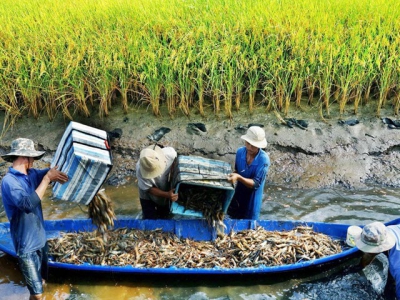Soc Trang farmers earn high from shrimp-rice farming

The shrimp-rice farming model has proved its sustainability and stability in both production and economic efficiency, especially in the context of climate change and serious saltwater intrusion. With a large specialized area for shrimp-rice farming, Soc Trang province is fully tapping the model’s advantages.
The shrimp-rice farming model proves efficient in the Mekong Delta region (Photo:sggp)
Tran Van Tien of Hoa De hamlet said both ST24 rice and giant blue-legged prawns are well inter-cropped in one field thanks to favorable weather conditions this year. He said he will harvest rice prior to prawn crop in April.
Tien is one of the first locals to have applied the shrimp-rice farm model and has earned a stable income ever since.
“With the terrain in Hoa De hamlet, it will be better and more sustainable to do one shrimp crop and one rice crop. After harvesting shrimp, we pump out saltwater and wash out alum for rice cultivation. We must inter-crop shrimp and rice because this area sees 6 months of saltwater and 6 months of fresh water. In August, when we have fresh water, we start sowing rice,” said Tien.
In the dry season My Xuyen farmers make the most of saltwater for shrimp farming while in the rainy season when freshwater comes from upstream, they wash out alum and pump out saltwater to grow rice. In this way, the shrimp-rice inter-crop model has been applied in My Xuyen through the years.
Ta Minh Bach, another farmer in Hoa De hamlet, said he reserves 6,000 square meters of land for the model. He harvests more than 1.5 tons of shrimp a year and an average of 500 kilos per 1,000 square meters from the rice field.
Bach said the production model is sustainable in the context of the current climate change.
“We do not earn higher profit but higher sustainability. It will be sustainable if you have one shrimp crop and also plant a rice crop. Rice cultivation makes the field cleaner while shrimp feces are good fertilizer for rice farming,” said Bach.

Shrimp and rice are inter-cropped in a field (Photo: tuoitre)
The specialized shrimp-rice farming area in My Xuyen district has developed for 20 years. In recent years, to increase the profits and value of the shrimp-rice farming model, the locals have cultivated high-yield rice varieties. Two shrimp-breeding cooperatives have been certified to meet VietGAP standards while about 60 hectares of rice has been granted organic rice certificates.
Tang Thanh Tri, Deputy Head of the My Xuyen Agriculture and Rural Development Section, said: “The model is environmentally friendly. Wastes in shrimp farming create good fertilizer for rice cultivation. In return, rice cultivation creates a clean environment for shrimp farming. In addition, the inter-crop will reduce pestilent insects.”
Over the past years, My Xuyen’s shrimp production has been consistently increasing from 30,000 tons in 2015 to more than 33,000 tons three years later. More importantly, the model has improved the ecological environment for shrimp to develop sustainably.
My Xuyen is outlining a project to expand the cultivation of Soc Trang’s specialty of ST rice varieties, specifically the ST25 rice, newly recognized as the World's Best Rice.
Dao Dac Hung, Deputy Chairman of My Xuyen district’s People’s Committee, said: “Last year, the ST25 rice by agricultural engineer Ho Quang Cua was named the world’s best rice. We plan to expand the shrimp-rice farming area in My Xuyen to cultivate the ST25 rice variety and turn it into a specialized zone. We hope to reserve 10-ha for the cultivation of the ST25 rice variety. With more incentive state policies in place, My Xuyen’s shrimp-rice farming area will expand.”
Soc Trang is building a road worth nearly 52,000 USD linking Soc Trang city to the My Xuyen shrimp-rice area to create favorable conditions for transportation and boost the local socio-economic growth.
Có thể bạn quan tâm
 Dragon fruit prices soar
Dragon fruit prices soar The price of dragon fruit has skyrocketed to VND40,000 per kilogram since the border gates between Vietnam and China were reopened, reversing course
 Bac Giang plans and produces 50 hectares of lychee to export to Japan
Bac Giang plans and produces 50 hectares of lychee to export to Japan The Deputy Minister of Agriculture and Rural Development Le Quoc Doanh on February 14 paid a field visit to the lychee production area for export in Luc Ngan
 Cashew farmers concern about price drop
Cashew farmers concern about price drop This year, they are expected to have a bumper crop, but a sharp fall in the price of cashew nuts has made them concern.